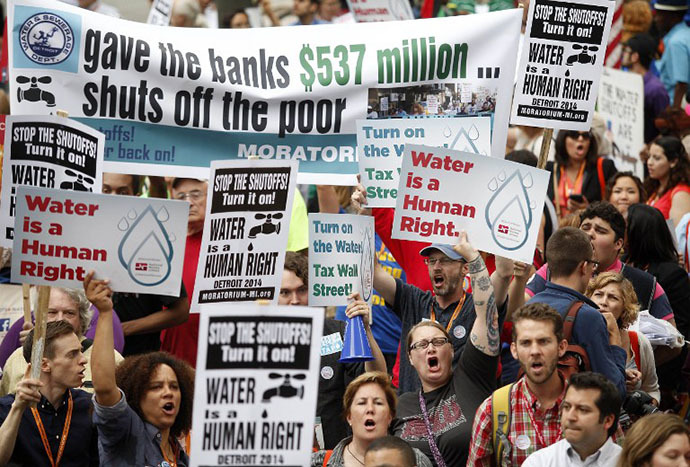This Year, Let’s Not Let Detroit Shut Off the Water

As the ground thaws, a now-familiar scene is beginning to re-enact itself on the streets of Detroit’s poorest neighborhoods. Those despised pickup trucks are circling around, with orders to cut the water flow. For now, they’re only targeting commercial accounts and so called “illegal hookups” – the now-pervasive practice of desperation in Detroit. Within weeks, we hear, the city will again be shutting off regular residential customers whose only crime is not having the money to pay for Detroit’s water.
This year, let’s not let them do it. What do I mean? Last year, our tremendous protests shook the city: thousands marched, dozens (including myself) were arrested in rolling blockades, and the world rallied to our side: from The Hulk (Mark Ruffalo) to the Daily Show with Jon Stewart to the Irish Parliament and even the United Nations. In response, the emergency manager ceded control of the water to Mayor Mike Duggan who quickly implemented a series of reforms called the 10-Point Plan. Minor as they were, these reforms showed the power of our grassroots movements to extract serious concessions for Detroiters. They have only put more wind behind our sails.
This year, let’s not let them just concede minor points. We have the opportunity to fundamentally restructure the way water is distributed and governed in metro Detroit, and we need to seize it. It is time to seriously consider both income-based rate structures and a meaningful debt amnesty program for long-delinquent accounts. Treating water as a commodity or luxury item that must be paid for or it will be withdrawn leads to the illogical conclusion that those who can’t find work can’t have water. If the city can’t guarantee a job to all of us who want to work, how can it demand a water bill? The only possible answer is: it can’t, and we won’t let it.
Solving Detroit’s water affordability crisis isn’t just about more financial assistance, it’s about job creation. Detroit is in desperate need of fixing, but can’t seem to come up with the funds to fix itself. Nevermind that the monopoly utility company makes billions in profits annually off our electrical needs. Nevermind that the water department spends hundreds of millions straight from your water bill payments (46 cents of every dollar) each year just on interest to bondholders: that’s pure profit to people who’ll never have their water cut off. Detroit isn’t broke, it’s just sending all of its residents’ money elsewhere rather than re-investing it locally.
Already, other cities are emulating Detroit’s dangerous precedent: Baltimore last week announced its intention to shut the water off to more than 25,000 delinquent accounts. Detroit has embarrassed the entire country, sparking comparisons to sub-Saharan Africa and other poverty-stricken regions that promise little in the way of human rights. Its current government should be ashamed to shut off the water (or the streetlights, or the front door) to anyone – and most certainly to those who can least afford it.
The Detroit Water Brigade has developed a citywide work program proposal that it is currently workshop-ing with a diverse array of community stakeholders: activist groups, labor unions, elected officials, social entrepreneurs, even the Mayor’s office. We are willing to work with anyone who wants to put unemployed and under-employed Detroiters back to work fixing the city, and we won’t stop until the last shutoff valve is cut back on when every resident in Detroit can afford the water.
The alternative to working constructively with us is another year of our resistance: more blockades, protests, international outcry and – this time around – economic direct action. We have amassed a larger network than ever, having delivered water and vital support to thousands of Detroiters. That network can be harnessed for good, canvassing the city with hundreds of volunteers and training Detroiters to make vital repairs to our city’s neglected infrastructure. Let’s come together rather than fight this year, showing the country and the world that Detroit can work together for the betterment of all. This year, let’s not let Detroit shut off the water.

